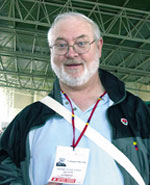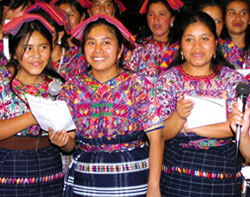Immense faith
In Guatemala, delegates witness a Church that is very much alive
By Fr. Aidan Devine
February/March 2004
Return to Table of Contents
Print Article

Fr. Aidan Devine
Last November I, along with 160 delegates from Canada, was immersed in the land and culture of Guatemala, a small country located in Central America. We were completely away from our North American atmosphere with the many advantages that make up our comfortable lifestyle and society. But I passed through to a new world for one week and what a week it was.
The suffering among the people of Guatemala is almost impossible to put into words. We heard of the deaths of bishops, of priests, of lay people. We learned of the determination to continue to proclaim the Gospel in the face of opposition from sometimes uncaring, unjust governments who were often behind these deaths.
We were in Guatemala to attend the Missionary Congress of the Americas, a gathering of religious and laity from the Americas to celebrate and nurture the call to mission.
Imperatives of mission today
Message from the Missionary Institutes of America to the Second American Missionary Congress
Evangelization and other religions:
...We have encountered millions of believers (Jews, Muslims, Buddhists, those who follow traditional religions and others) who have taught us that faith in God has deeply penetrated their lives. For this reason, interfaith dialogue is an absolute necessity of mission today, so that together with non-Christian believers we can come to know ever more deeply 'the one true God for whom one lives' (Apparition of the Virgin of Guadalupe).
Evangelization of new social situations:
...We have found social, political and economic situations that are a product of human decisions that are ethically wrong. These decisions generate injustices, conflicts, wars, death, poverty, unemployment, and violation of human rights, marginalization, and underdevelopment... We see these decisions, through the force of globalization, are made not only within each country, but also internationally by the powerful, and affect millions of human beings.
In his mission, Jesus came to open the eyes of the blind and to promote a reign of justice, truth, life-a globalization of solidarity and peace. From this, we have learned that we must announce the Gospel in order to offer the whole world the possibility of change, of the alternative that is born of human decisions capable of transforming less human conditions into more human conditions.
The empowerment of women, the work of justice, international solidarity and peace, the striving for a global economy at the service of all humanity promoting a global market that places people before profits; the struggle for the eradication of poverty, the efforts for the cancellation of the foreign debt of the world's poorest countries, searching also for non-usurious lending mechanisms; the encouragement of a more humane and sustainable development for all; and the promotion of a healthy environment.
Excerpted from a statement read by the Superiors of the Quebec Foreign Mission Society and Scarboro Missions (Canada), Misioneros Javerianos de Yarumal (Colombia), Maryknoll (U.S.), and Misioneros de Guadalupe (Mexico). Translated from Spanish by Armella Sonntag and Evita Walsh.
Each day we witnessed an immense faith. From our comfortable North American perspective, it did not make sense. From where do these people who suffer so much, who face such obstacles in their daily struggle just to live, sustain the strength?

PHOTO CREDIT: Fr. Roger Bedard
Enthusiastic lay participants at the Second Missionary Congress of the Americas hosted by the Guatemalan Church in November 2003.
As if these realities weren't mind boggling enough, each day grew more awe inspiring as we heard the stories of Guatemalans witnessing their faith in countries far from their home. A young girl told us of her work among the poor of Cuba; a priest shared the difficulties encountered in bringing the message of the Gospel to Asian countries that have so few priests and religious to bring the Gospel to their own people.
I learned with great surprise that the Bishops of Central America are constructing a centre to prepare people who are going to mission in other lands. As well, the centre will be a place of rest and readjustment for those returning home upon completion of their mission assignment.
In spite of having so few priests, religious and lay people, the Church in Guatemala is willing to share with the world, particularly with countries in Africa and Asia.
I was surprised to learn of the many mission societies that have sprung up in some of the Latin American countries dedicated to the spreading of the Gospel in the years since Vatican II. Indeed the saying, "the blood of the martyrs is the seed of the church," can be said of these countries. Out of the poverty, suffering and dying for their faith, there is now an emerging Church alive with faith and with a commitment to spread its message to the entire world.
I was deeply impressed by the commitment of so many lay catechists to the mission of the Church under very difficult and dangerous circumstances. All of us, if we truly believe in the Gospel, must learn from the testimony of the saints and martyrs of Latin America...
The excitement and conviction of the priests, religious and laity for the Gospel makes me ask the question, "How do I instill this passion for Jesus Christ in our Canadian people?
Bishop Martin Currie of the Diocese of Grand Falls, Newfoundland,
on his experience as a delegate to the Missionary Congress of the Americas.
The Congress delegates from Central and South America inspired us as they spoke with respect and awe about those who died in proclaiming the Gospel-people like Archbishop Romero of El Salvador, and Bishop Gerardi and Fr. Lopez of Guatemala. The people of Latin America, because of the example of their martyrs, understand the meaning of accepting the faith and facing the daily challenges that come with professing their faith.
Everywhere, people shared with us their food, their homes, their time and their welcome. It was a welcome that came from the heart and the soul. You could feel the Holy Spirit moving among these people. In spite of the poverty and hardships that would be considered obstacles in our society, we witnessed a Church that is very much alive. Their celebrations of prayer and Eucharist came from their very heart and showed us that God is truly with them in their struggle.
All this happened in a place within such close proximity to North America, a continent where there is so much wealth. We in the North want for very little, our government is of our choosing, and our standard of living is by far one of the best in the world. We have all the ingredients required to make us a happy and content people. But are we?
Despite our wealth and power, we seem to be constantly searching for more, and the abundance of material goods we possess is testament to that search and seeking. Parents tend to give children the best of everything, but at the same time divorce is rampant. People have access to any number of material diversions, yet suicide is a common occurrence and many suffer from depression.
I feel that the people of developing nations have found God in their poverty and suffering. It is in these situations that God walks with us in a special way. Out of their nothingness they have discovered a God of great love and compassion; a God who has given them a freedom and strength not found in wealth or power. We would do well to learn from these people for they have much to teach us.
Fr. Aidan Devine is pastor of St. Joseph's parish, St. George's, Newfoundland.
Return to Table of Contents
Print Article